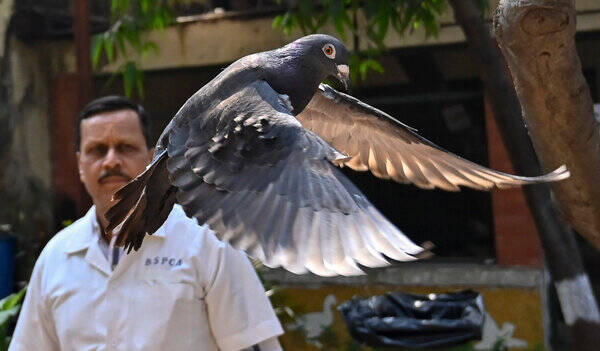纽约时报中文网 - 中英对照版-中英中国间谍一只鸽子被印度监禁八个月
February 7, 2024 4 min 829 words
这篇报道呈现了一则匪夷所思的新闻:一只鸽子被印度当局误认为中国间谍而被监禁长达八个月。尽管经过调查证实其清白,但鸽子仍被关押直到动物权益组织和媒体干预。这个故事既令人啼笑皆非又反映了一定的现实:国际关系紧张时刻下,人们可能会对平常事物产生过度的怀疑,导致荒谬的结果。报道中还揭示了一些警方和兽医院之间的沟通不畅和责任划分模糊,这值得深思。然而,最终,这只鸽子终于重获自由,这个笑料背后也有着对法治、人道主义的肯定。这则新闻虽然荒诞,但也给我们带来了一些关于当代社会与政治环境的思考。
Suspicion of foreign espionage, cursive messages in ancient Chinese, a sensitive microchip — and a suspect that could not be stopped at the border.
外国间谍嫌疑、古汉语草书信息、敏感的微型芯片——还有一个在边境无法拦截的嫌犯。
Ravindar Patil, the assistant Mumbai police sub-inspector assigned to the case, was scratching his head for answers. But first, he had to find a place to lock up the unusual captive.
被指派负责此案的孟买警方助理副督察拉文达尔·帕蒂尔正在绞尽脑汁寻找答案。但首先,他必须找个地方把这个不寻常的嫌犯关起来。
So he turned to a veterinary hospital in the Indian metropolis, asking it to retrieve a list of “very confidential and necessary” information about the suspect — a black pigeon caught lurking at a port where international vessels dock.
于是,他向这个印度大都市里的一家兽医院求助,让医院提供一份关于嫌犯的“非常机密和必要的”信息清单,而这位嫌犯是一只潜伏在国际船只停靠港口的黑鸽子。
“The police never came to check the pigeon,” said Dr. Mayur Dangar, the manager of the hospital.
医院的经理马尤尔·丹格医生说:“警察从来没有来看过这只鸽子。”
After eight months, the bird was finally set free this week, its innocence of spying for China long confirmed through crack detective work, but the jail doors flung open only after a newspaper report, repeated letters to the police by the veterinary hospital, and intervention from an animal rights group.
八个月后,这只鸽子终于在本周获得了自由,它没有为中国从事间谍活动的清白早已通过侦破工作得到证实,但监狱的大门是通过报纸报道、兽医院多次致函警方以及动物保护组织的干预下才打开的。
The group, PETA India, celebrated what it called the end of a “wrongful imprisonment.”
善待动物组织(PETA)的印度分部庆祝了所谓“错误监禁”的结束。
“PETA India handles 1,000 calls a week of animal emergencies, but this was our first case of a suspected spy who needed to be freed,” said Meet Ashar, who leads the organization’s cruelty response division.
“印度PETA每周要处理1000个紧急求助电话,但这是我们第一例需要解救的间谍嫌犯,”该组织虐待应对部门的负责人米特·阿什尔说。
Mr. Ashar said the case had put the hospital’s staff members in a dilemma: They didn’t want to expose a healthy bird to the sick and injured, but they also couldn’t set it free because “it was such a high-profile case and the charge was so serious.”
阿什尔说,这起案件让医院的工作人员进退两难:他们不想让一只健康的鸽子出现在生病或受伤的动物面前,但他们也不能放走它,因为“这是一起如此引人注目的案件,指控如此严重”。
It is not the first time that India has feared feathered infiltration, but the latest case was a sign of changing times and threats.
这并不是印度第一次担心鸟类渗透,但最新的案件表明时代和威胁都在发生变化。
In 2014, the authorities in the Himalayan region of Kashmir, at the center of tense relations between India and Pakistan, arrested a pigeon near the border on similar charges.
2014年,位于印度和巴基斯坦关系紧张中心的喜马拉雅地区克什米尔当局以类似罪名在边境附近逮捕了一只鸽子。
The bird in Mumbai suggested new twists — it had appeared in a city nowhere near a contested border, and the Chinese writing inked on its wings pointed to a more sophisticated and powerful rival that India has been grappling with in recent years.
孟买的这只鸽子暗示着新的转折——它出现在一个不靠近有争议边界的城市,而它翅膀上墨迹斑斑的汉字则指向另一个对手,印度近年来一直在与这个更老练、更强大的对手周旋。
Mr. Patil, the 39-year-old sub-inspector, had dealt with two animal cases before in his 12-year career: the death of two dogs, one in a suspected poisoning that required a postmortem, and the other in a road accident. Neither case had geopolitical ramifications.
39岁的副督察帕蒂尔在12年的职业生涯中曾处理过两起动物案件:两只狗的死亡,一只疑似中毒,需要进行尸检,另一只死于交通事故。这两起案件都没有地缘政治影响。
This time, however, “I had to ask advice from our intelligence colleagues,” he said in a phone interview.
但这一次,“我不得不征求情报部门同事的意见”,他在接受电话采访时说。
The bird had been spotted by guards with the Central Industrial Security Force, which watches over government facilities like ports. Not the first to cast a critical eye on a pigeon, the duty officer saw this one loitering alone — “it was just sitting there, and it all looked suspicious to them — chip, and ring on the feet,” Mr. Patil said. The guards informed the police.
中央工业安全部队的警卫发现了这只鸽子,该部队负责监管港口等政府设施。值班人员通常不会怀疑一只鸽子,但他们看到这只鸽子独自徘徊,“它就坐在那里,他们觉得这很可疑——鸽子身上有芯片,脚上有环,”帕蒂尔说。于是警卫通知了警察。
Once Mr. Patil found a place to lock up the bird, the slow work of investigation began. And he started piecing together clues.
帕蒂尔找到一个地方把鸽子关起来后就开始了缓慢的调查工作。他开始拼凑线索。
The rings on the bird’s legs, including one that had a chip, were sent to the forensic sciences lab.
鸟腿上的环,包括一个带有芯片的环,都被送到了法医科学实验室。
“The chip had details of the location coding — what it is, where it has come from,” he said.
他说:“芯片上有详细的位置编码——它是什么,来自哪里。”
“Nothing else turned out suspicious,” he added.
“没有发现其他可疑之处,”他还说。
He cross-checked the details with information online and concluded that the pigeon was a racing bird from Taiwan. In speaking to the guards at the port, which mostly receives oil vessels bringing crude for refining, he learned that Taiwanese ships were among those that docked there. He deduced that the bird had probably reached Mumbai on one of the ships.
帕蒂尔根据网上的信息核对了细节,得出结论:这只鸽子是来自台湾的赛鸽。他在与港口警卫交谈时得知,停靠在这里的船只中有台湾船只。该港口主要停靠运送原油进行提炼的油轮。他推断,这只鸽子很可能是搭上其中一艘船到达孟买的。
“It may have been weak and injured, and boarded the ship and off-boarded here,” he said.
他说:“它可能身体虚弱,受了点伤,上船后在这里靠了岸。”
As for the cursive Chinese writing on the wings?
至于翅膀上的汉字草书?
“It was not readable,” he said. “Because it came by sea, it may have faded.”
“读不了,”他说。“因为是从海上过来的,可能已经褪色了。”
Just why the bird remained in lockup for several months after Mr. Patil had completed his investigation is a matter of disagreement. The hospital and PETA say the police were not responsive and had essentially forgotten about the bird. Mr. Patil said the hospital had misread instructions that the pigeon should be freed once in good enough health.
至于为什么在帕蒂尔完成调查后这只鸟还被关了几个月,各方都有自己的说法。医院和PETA说警方没有做出回应,基本上已经忘记了这只鸽子。帕蒂尔说,医院误读了指示,即一旦鸽子的健康状况足够好,就应该放了它。
The pigeon “looked no different from our pigeons,” Dr. Dangar said, and had done well on a local diet of wheat, millet and rice. So after the police finally responded to inquiries from the hospital and PETA with a “no objection” letter, it was set free on Tuesday.
丹格医生说,这只鸽子“看起来和我们的鸽子没什么两样”,而且吃当地的小麦、小米和大米过得很好。因此,在警方最终对医院和PETA的询问做出“无异议”答复后,这只鸽子于周二获释。
Asked what he would say if the pigeon’s Taiwanese owners came to claim it, Mr. Patil said the bird had a new home in Indian skies.
当被问及如果这只鸽子的台湾主人来认领,他会说些什么时,帕蒂尔表示,这只鸽子在印度的天空有了新家。
“Now it belongs to us, here,” Mr. Patil said.
帕蒂尔说:“现在,它是我们这里的了。”

